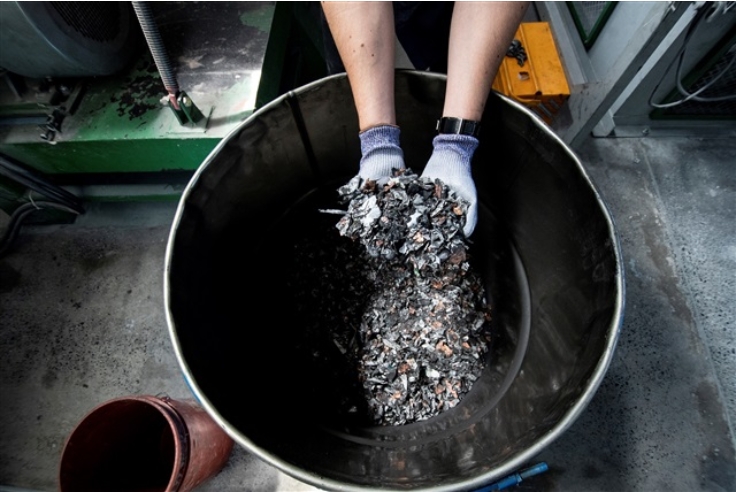 欧盟电池回收新规激发市场潜力
欧盟电池回收新规激发市场潜力
EU's battery recycling mandates spark surge in market potential
译文简介
欧盟有关汽车动力电池新法规一方面使得该区域动力电池原料供应链可持续性去风险性增强也激发了韩国美国投资欧盟废旧电池回收业的热情
正文翻译

EU's battery recycling mandates spark surge in market potential
欧盟电池回收新规激发市场潜力
第一段:
The EU Batteries Regulation, which came into force on February 18, 2024, mandates that new batteries must incorporate a specified proportion of recycled materials beginning in 2031. Originally projected to be below 4GWh by 2025, this legislation is poised to escalate Europe's battery recycling capacity to 200GWh by 2040, catalyzing scrutiny of the battery resource utilization market within the continent and prompting keen interest from stakeholders in South Korea.
今年2月18日生效的《欧盟电池条例》强制性要求从2031年起,新电池生产中必须融入额定回收材料。这项法令最初设定的目标是从2025年预估的4GWh的电池回收产能提升到2040年的200GWh。这一法律将促成欧陆电池回收利用市场得到有效监管,并引燃韩国利益攸关方热情。
第二段:
今年2月18日生效的《欧盟电池条例》强制性要求从2031年起,新电池生产中必须融入额定回收材料。这项法令最初设定的目标是从2025年预估的4GWh的电池回收产能提升到2040年的200GWh。这一法律将促成欧陆电池回收利用市场得到有效监管,并引燃韩国利益攸关方热情。
第二段:
As reported by South Korean media outlet The Elec, the Regulation outlines that by 2031, newly manufactured batteries must contain recycled material in the following ratios: nickel 6%, cobalt 16%, lead 85%, lithium 6%. By 2036, these proportions will increase to nickel 15%, cobalt 26%, lead 85%, lithium 12%.
据韩国媒体 TheElec 报道,该项法令概略要求2031年新生产的电池中应当含有的回收旧电池材料不低于以下比例:镍6%,钴16%,铅85%,锂6%;至2036年上述材料比例则应为:镍15%,钴26%,铅85%,锂12%.
第三段:
据韩国媒体 TheElec 报道,该项法令概略要求2031年新生产的电池中应当含有的回收旧电池材料不低于以下比例:镍6%,钴16%,铅85%,锂6%;至2036年上述材料比例则应为:镍15%,钴26%,铅85%,锂12%.
第三段:
Presently, 70% of Europe's battery recycling equipment supply emanates from local enterprises, with foreign contenders such as Redwood Materials from the United States and SungEel Hitech from South Korea making inroads. Redwood Materials, founded by Tesla's former Chief Technology Officer, recently completed the acquisition of Redux Recycling, a European battery recycling firm boasting an annual production capacity of 10,000 tons.
当下,欧洲70%电池回收设备供应出自当地公司;与此同时,以美国Redwood Materials、韩国SungEel Hitech为代表的外国供货竞争者正在跑步入场。Redwood Materials由特斯拉公司前首席技术总监建立,他最近刚刚收购了欧洲当地据称拥有年处理万吨产能Redux电池回收公司。
第四段:
当下,欧洲70%电池回收设备供应出自当地公司;与此同时,以美国Redwood Materials、韩国SungEel Hitech为代表的外国供货竞争者正在跑步入场。Redwood Materials由特斯拉公司前首席技术总监建立,他最近刚刚收购了欧洲当地据称拥有年处理万吨产能Redux电池回收公司。
第四段:
SungEel Hitech operates two waste battery recycling plants in Hungary, with one processing facility boasting an annual capacity of 10,000 tons, focusing on the waste treatment generated during battery production. The second facility can handle batteries from 20,000 electric vehicles annually, facilitating the recycling of 50,000 tons of battery waste.
韩国SungEel Hitech公司在匈牙利开设了两个废旧电池回收工厂。其中之一据称对电池生产过程中的废料拥有年均万吨的处理能力;另一家工厂则能年均处理两万辆退役电动车电池所产生的五万吨废旧电池的能力。
第五段:
韩国SungEel Hitech公司在匈牙利开设了两个废旧电池回收工厂。其中之一据称对电池生产过程中的废料拥有年均万吨的处理能力;另一家工厂则能年均处理两万辆退役电动车电池所产生的五万吨废旧电池的能力。
第五段:
Other South Korean firms are also eyeing opportunities in the European battery recycling market. Ecopro has announced collaborative ventures with SK ecoplant and TES-Envirocorp Pte to construct a battery recycling plant in Hungary, slated for completion by the end of 2024.
许多其他韩国企业也将目光瞄向了欧洲电池回收市场。Ecopro公司已经宣布与 SK ecoplant 、 TES-Envirocorp Pte公司组建合资企业,拟议中的首家电池回收工厂预计在今年年底于匈牙利完工。
第六段:
许多其他韩国企业也将目光瞄向了欧洲电池回收市场。Ecopro公司已经宣布与 SK ecoplant 、 TES-Envirocorp Pte公司组建合资企业,拟议中的首家电池回收工厂预计在今年年底于匈牙利完工。
第六段:
IS Dongseo's acquisition of European resource utilization company BTS Technology in 2023 grants access to a factory capable of processing batteries from 50,000 electric vehicles annually. Plans are underway to establish a battery processing front-end plant in Europe.
2023年IS Dongseo对欧洲资源利用公司BTS Technology的收购使得该公司获得了年均五万辆报废电动车电池回收能力。该公司正着手设立一个欧洲头部电池处理工厂。
第七段:
2023年IS Dongseo对欧洲资源利用公司BTS Technology的收购使得该公司获得了年均五万辆报废电动车电池回收能力。该公司正着手设立一个欧洲头部电池处理工厂。
第七段:
Approximately 48-54% of the components are recyclable for used lithium-ion batteries. A typical electric vehicle battery pack contains around 41 kilograms of nickel, 9 kilograms of cobalt, 12 kilograms of manganese, and 8 kilograms of lithium. However, sourcing materials such as nickel, lithium, and cobalt is constrained to specific countries, presenting procurement challenges.
锂离子电池中大约有48-54%的物质可以回收。一个典型的电动车电池组大约含有41公斤的镍,9公斤的铅,12公斤的锰以及8公斤左右的锂。然而稀有原料,如镍、锂、钴等多出自一些特定国家的现实导致供应挑战尚存。
第八段:
锂离子电池中大约有48-54%的物质可以回收。一个典型的电动车电池组大约含有41公斤的镍,9公斤的铅,12公斤的锰以及8公斤左右的锂。然而稀有原料,如镍、锂、钴等多出自一些特定国家的现实导致供应挑战尚存。
第八段:
Consequently, beyond its environmental imperatives, battery recycling holds promise for diversifying the supply chain of crucial battery materials. The Korea Trade-Investment Promotion Agency (KOTRA) estimates that by 2030, the global lithium-ion battery recycling market could reach US$25.3 billion, with approximately 320,000 tons of electric vehicle battery waste sourced from Europe.
因此,除去环境因素考量,电池回收产业对于供应链安全来说也是至关重要。韩国贸易投资促进局测算,截止2030,全球锂离子电池回收市场将达到253亿市场规模,其中32万吨废旧电池资源将来自欧洲。
因此,除去环境因素考量,电池回收产业对于供应链安全来说也是至关重要。韩国贸易投资促进局测算,截止2030,全球锂离子电池回收市场将达到253亿市场规模,其中32万吨废旧电池资源将来自欧洲。
评论翻译
本文出自新近报道,存有较新、较为珍贵废旧锂离子电池回收产业数据与远景展望。
很赞 ( 3 )
收藏